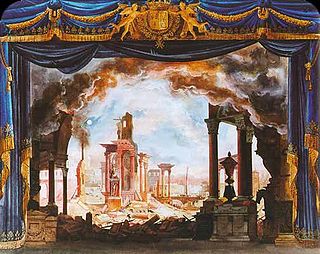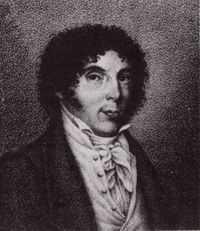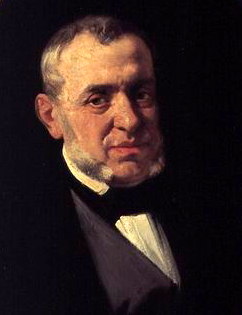
Le siège de Corinthe is an opera in three acts by Gioachino Rossini set to a French libretto by Luigi Balocchi and Alexandre Soumet, which was based on the reworking of some of the music from the composer's 1820 opera for Naples, Maometto II, the libretto of which was written by Cesare della Valle.

Francesco (Franco) Antonio Faccio was an Italian composer and conductor. Born in Verona, he studied music at the Milan Conservatory from 1855 where he was a pupil of Stefano Ronchetti-Monteviti and, as scholar William Ashbrook notes, "where he struck up a lifelong friendship with Arrigo Boito, two years his junior" and with whom he was to collaborate in many ways.

Gianni di Parigi is an 1839 melodramma comico in two acts with music by Gaetano Donizetti to a libretto by Felice Romani, which had previously been set by Francesco Morlacchi in 1818 and by Giovanni Antonio Speranza in 1836.

Adelaide di Borgogna, ossia Ottone, re d'Italia is a two-act opera composed by Gioachino Rossini to a libretto by Giovanni Schmidt. It was premièred at the Teatro Argentina in Rome on 27 December 1817.

Ivanhoé is an 1826 pastiche opera in three acts with music by Gioachino Rossini to a French-language libretto by Émile Deschamps and Gabriel-Gustave de Wailly, after Walter Scott's novel of the same name. The music was adapted, with the composer's permission, by the music-publisher Antonio Pacini from Rossini's operas, namely Semiramide, La Cenerentola, La gazza ladra, and Tancredi in order to introduce his music to Paris. An examination of the score shows that Pacini also used music from Bianca e Faliero, Armida, Maometto II, Aureliano in Palmira, Sigismondo, Torvaldo e Dorliska, Mosè in Egitto and an amount of newly composed music including fanfares and the gallop that was later to become famous from its inclusion in Guglielmo Tell. The work was premiered on 15 September 1826, at the Odéon Theatre.

Amica is an opera in two acts by Pietro Mascagni, originally composed to a libretto by Paul Bérel. The only opera by Mascagni with a French libretto, it was an immediate success with both the audience and the critics on its opening night at the Théâtre du Casino in Monte-Carlo on 16 March 1905. Mascagni himself conducted the performance. The opera had its Italian premiere on 13 May 1905 at the Teatro Costanzi in Rome.
Dano Raffanti is an Italian tenor, particularly associated with the Italian baroque and bel canto repertory.

Le cantatrici villane is a comic opera in two acts composed by Valentino Fioravanti to a libretto by Giuseppe Palomba. It was first performed in Naples in 1799. A revised one act version premiered at the Teatro San Moisè in Venice as Le virtuose ridicole in 1801.
I Cavalieri di Ekebù is an opera composed by Riccardo Zandonai to an Italian libretto by Arturo Rossato. The opera is based on Gösta Berlings Saga by Nobel laureate Selma Lagerlöf. It was first performed at the Teatro alla Scala in Milan, Italy on 7 March 1925.

Il re is a novella or opera in one act and three scenes by composer Umberto Giordano to an Italian libretto by Giovacchino Forzano. The opera premiered at La Scala in Milan on 12 January 1929.
L'empio punito is an opera by composer Alessandro Melani. Notably the first opera written on the subject of Don Juan, the work uses an Italian language libretto by Giovanni Filippo Apolloni and Filippo Acciaiuoli. The opera was commissioned by Marie Mancini for performance during Carnival of 1669. The work premiered at the Teatro di Palazzo Colonna in the historic Borgo district of Rome on 17 February 1669.

Antonio Cagnoni was an Italian composer. Primarily known for his twenty operas, his work is characterized by his use of leitmotifs and moderately dissonant harmonies. In addition to writing music for the stage, he composed a modest amount of sacred music, most notably a Requiem in 1888. He also contributed the third movement, Quid sum miser, to the Messa per Rossini, a collaborative work created by thirteen composers to honor Gioacchino Rossini.

Alberto Mazzucato was an Italian composer, music teacher, and writer.

Stefano Pavesi was an Italian composer.

Salvator Rosa is an opera seria in four acts composed by Antônio Carlos Gomes to a libretto in Italian by Antonio Ghislanzoni. It premiered at the Teatro Carlo Felice in Genoa on 21 March 1874. The plot is based on Eugène de Mirecourt's 1851 adventure novel, Masaniello, in turn loosely based on the lives of the Italian painter and poet, Salvator Rosa and Masaniello, a Neapolitan fisherman, who became leader of the 1647 revolt against the Spanish Habsburg rule in Naples.
Conchita is an opera in four acts and six scenes by composer Riccardo Zandonai. The work uses an Italian language libretto by Maurizio Vaucaire and Carlo Zangarini which is based on Pierre Louÿs's 1898 novel La Femme et le pantin. The work premièred in Milan at the Teatro dal Verme on 14 October 1911 with soprano Tarquinia Tarquini, who later married Zandonai in 1917, in the title role. Her portrayal was lauded by critics and she went on to perform Conchita at the Royal Opera, London (1912), the Cort Theatre in San Francisco (1912), the Philarmonic Auditorium in Hollywood (1912), the Heilig Theatre in Portland (1912), the Metropolitan Opera House in Philadelphia (1912), the Chicago Grand Opera Company (1913), the Metropolitan Opera in New York City (1913), and the Teatro di San Carlo in Naples (1913).

Gloria is a tragic opera in three acts by Francesco Cilea with an Italian libretto by Arturo Colautti. A variation on the Romeo and Juliet story and set in 14th century Siena, the libretto is based on Victorien Sardou's 1874 play La Haine (Hatred). The opera premiered on 15 April 1907 at La Scala conducted by Arturo Toscanini with Solomiya Krushelnytska in the title role. Gloria was a failure at its premiere when it was withdrawn after two performances and fared little better in the 1932 revised version, although there have been two late 20th century revivals. It proved to be Cilea's last staged opera. In the 43 years following the premiere of Gloria he worked on two or three further operas which were never performed and continued to compose chamber and orchestral music.
La rosa bianca e la rosa rossa(The White Rose and the Red Rose) is an opera in two acts composed by Simon Mayr to an Italian libretto by Felice Romani. It premiered at the Teatro Sant'Agostino in Genoa on 21 February 1813. Set in England against the backdrop of the Wars of the Roses, Romani's libretto is based on René Charles Guilbert de Pixérécourt's La rose blanche et la rose rouge. Mayr's opera has also been performed under the title Il trionfo dell'amicizia(The triumph of friendship).

Gaetano Coronaro was an Italian conductor, pedagogue, and composer. He was born in Vicenza and had his initial musical training there followed by study from 1871 to 1873 at the Milan Conservatory under Franco Faccio. He composed orchestral works, sacred music and chamber pieces as well as five operas. La Creola which premiered at the Teatro Comunale di Bologna in 1878 was the only one to have any success.

Pelagio is an opera in four acts by Saverio Mercadante. The Italian-language libretto was by Marco D'Arienzo. It premiered on 12 February 1857 at the Teatro San Carlo, Naples, to great success.














